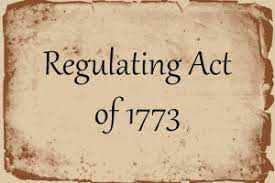Regulating Act of 1773 was enacted in order to improve the condition of the East India Company. It was the first step taken by the British Government to control and regulate the affairs of the East India Company in India. Following are the provisions of this act.

- It designated the Governor of Bengal as the ‘Governor-General of Bengal’ and created an Executive Council of four members to assist him. The first such Governor-General was Lord Warren Hastings.
- Supreme Court was introduced at Calcutta.
- The act barred the members of the council as well as the governor-general to accept any kind of gift.
- The government in the presidency of Madras and Bombay was made subordinate to the government in Calcutta.
- The significance of the Regulating Act is that it brought the affairs of the Company under the control of the Parliament.
- Besides, it proved that the Parliament of England was concerned about the welfare of Indians.
- The greatest merit of this Act is that it put an end to the arbitrary rule of the Company and provided a framework for all future enactments relating to the governing of India.
Note: There was a practice of corruption in the company and the company was not performing well hence, the Regulating Act of 1773 was introduced.
Important Links